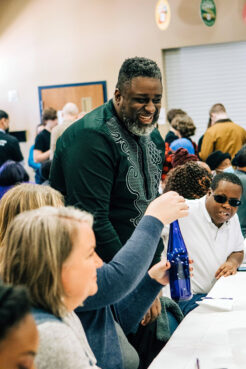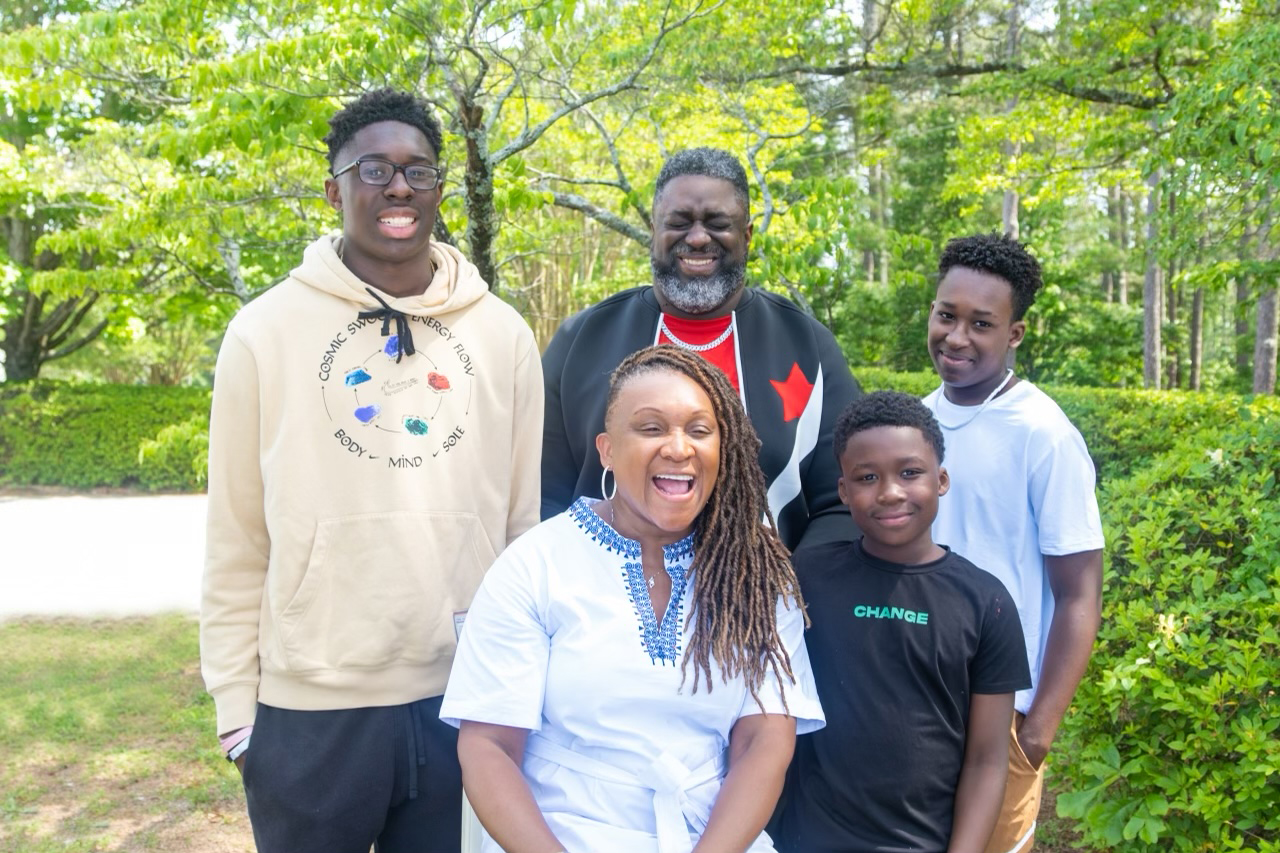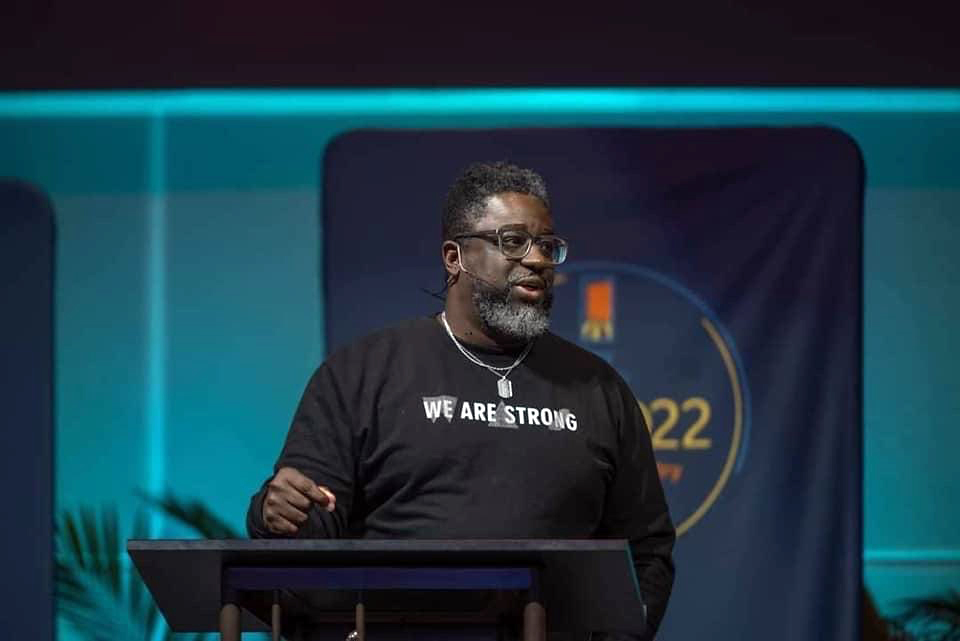
(RNS) — When pastor Lamar Hardwick was diagnosed with autism at age 36, it was like he was meeting himself for the first time.
“I spent my whole life not knowing what people wanted from me, what they expected from me,” Hardwick told Religion News Service in a Zoom call from his home in Georgia. “When I was diagnosed, it was like for the first time I understood I was human.”
Not long after his life-changing diagnosis, Hardwick began blogging about faith and autism. A few viral posts later, he adopted the moniker given to him by one of his new online connections: The Autism Pastor. He was soon speaking at national conferences and securing book deals, all while pastoring a church, completing a Doctor of Ministry program (and, later, starting a Ph.D.) and ministering directly to folks on the autism spectrum. Described by friends and colleagues as “brilliant” and “surprisingly funny,” Hardwick is also known for his dynamic sermons.
“He’s soft-spoken, until he’s preaching,” said Larry Asplund, who served on a pastoral team with Hardwick.
Recently, Hardwick has faced another earth-shattering diagnosis: stage 4 cancer. While his treatment has forced him to retire from his church at age 45, his hope-filled mantra for this season comes directly from Scripture: “I will not be shaken,” Hardwick quoted to RNS from the Psalms. Even as his body copes with the cyclical aftershocks of prolonged chemotherapy, he remains a prolific writer, especially on nights when steroids keep him wired. His next book, “How Ableism Fuels Racism: Dismantling the Hierarchy of Bodies in the Church,” is set to be released from Brazos Press later this month, and he has another two books in the works.

Pastor Lamar Hardwick participates in the Tri-Cities Church 10th Anniversary Celebration in East Point, Ga. (Photo by Kamesha Yvonne Photography)
Hardwick’s early life was shaped by his father’s dual career as a Missionary Baptist Church pastor and member of the U.S. army. He was born in Killeen, Texas, but moved frequently in childhood, including to Germany for nearly four years, and the destabilization didn’t help with the social challenges he faced as a kid with undiagnosed autism.
“It felt like the whole world was in on an inside joke that I didn’t get,” Hardwick told RNS.
In church, Hardwick appreciated the predictable rhythms and rituals: Communion every first Sunday, choir practice on Wednesdays, Sunday school. In his historically Black church context, autism and other disabilities usually went unmentioned. The exception was the disabled folks on the “sick and shut-in list” that embellished the back of the bulletin.
Despite his academic abilities, by high school Hardwick was still struggling socially. He found a remedy in the form of drugs and alcohol.
“What I discovered was, the only way to be … a ‘people person’ that people thought I should be was when I was in an altered state,” said Hardwick, who added that using substances made him less of a target for being bullied. “Fortunately, I hit a wall where I realized that this is not a long-term strategy,” he said.
That wall came in the form of a freak car accident during his first year of college at Concordia University Wisconsin. He viewed the crash as what he called “a Jonah experience.” While no illegal substances were involved in the crash, Hardwick felt like he’d injected chaos into the lives of his friends by fleeing from God.
“I think that was one of the ways that God caught my attention,” said Hardwick, who said it felt as if God was telling him to realize the impact his life had on those around him.
One of those people is now his wife, Isabella, whom he credits with being one of his greatest spiritual influences. In the wake of the accident, Hardwick kicked his drug and alcohol habits, and his spiritual outlook was transformed. For the first time, he began to think of God as someone who was intimately concerned about him.

Lamar and Isabella Hardwick with their family. (Photo by Tonesha Smith Photography)
Eventually, Hardwick discerned a call to ministry. He moved to attend Candler School of Theology at Emory, and in 2010 was hired as a youth pastor at New Community Church in LaGrange, Georgia. In one year, he grew a dwindling youth program of about 12 teens to one with 150, he said. “They just felt comfortable coming to our church because I was just as socially awkward as they were,” Hardwick joked.
When the church’s lead pastor resigned in 2012, Hardwick was tapped to serve as the interim pastor. And in many ways, he excelled.
“He’s a master preacher,” said Asplund, who was on the pastoral staff at New Community Church. “People would come just to hear him preach.”
But when he left the stage, Hardwick was expected to remain a charismatic figure. And that was simply not in his skill set.
“People said I looked angry or mean, that I am standoffish. I would hear people say things like ‘He walked past me and he didn’t speak,’ all the things that I knew I would never intentionally do,” said Hardwick.
Hardwick had been hearing comments like these since he was a kid, but now, the stakes were higher. The feedback prompted him to seek out a diagnosis, and in 2014, a clinical psychologist confirmed he was on the autism spectrum.
After disclosing his diagnosis to his church, the congregation built in support staff to focus on pastoral areas that were more difficult for him. Church members became more aware of and sensitive to his needs around social activities and sensory input. In the new environment, Hardwick said, “I was able to soar.”
His diagnosis led Hardwick to reevaluate not only how churches could be more hospitable toward folks on the spectrum — by providing sensory bags with fidgets and noise canceling headphones, by not pushing nonconsensual touch and by posting clear signage for those who struggle with executive functions, for instance — but also to ask how churches could center folks with disabilities in general.
After eight-plus years at New Community Church, in 2019 Hardwick transitioned to a lead pastor role at Tri-Cities Church in East Point, Georgia, where he continued to make disability justice part of the church’s ethos.
“He made it as important of a topic as any other thing we did as a church,” said Jamie Stovall, who served as the kids’ pastor at Tri-Cities Church.
In 2021, Hardwick’s ideas culminated in the book “Disability and the Church: A Vision for Diversity and Inclusion.”
Beth Golik, operations director for Key Ministry, an organization that helps churches welcome kids with hidden disabilities, described the book as the go-to resource for churches looking to prioritize disability justice. “It gives people a new perspective on the fact that this is not a niche ministry,” said Golik. “This is what our churches need to be thinking about across the board in every ministry.”
The book launch came amid a time of challenge for the pastor. In 2020, Hardwick was diagnosed with stage 3 colorectal cancer. Several rounds of treatment and a surgery later, his case was in remission, but in 2022 the cancer returned. This time, though, tiny cancerous specks had also appeared on his lungs, and the doctors determined that because of the cancer’s location, surgery wasn’t an option.

Pastor Lamar Hardwick preaches during the Inclusion Fusion Disability Ministry Conference. (Courtesy photo)
“The last word was we’re going to do palliative chemo, which is just to control the cancer, but we’re not going to be able to remove it,” Hardwick said. “So we’re dealing with stage 4, but the chemo is controlling it.”
In March 2023, Hardwick ended up in the emergency room twice for severe stomach pain. The doctors dismissed his symptoms as constipation and only gave him pain medication after his second visit. It was only after Hardwick and his wife drove to a hospital an hour away that a doctor discovered a bowel obstruction caused by scar tissue from Hardwick’s cancer treatment. His colon was dilated almost 9 centimeters and he was “about a couple hours to a day away from dying,” Hardwick recalled.
In his forthcoming book, “How Ableism Fuels Racism,” Hardwick recalls this incident and interrogates how the suffering of both Black and disabled bodies has been normalized — in part, he argues, because pain has been associated with bodies viewed as morally inferior.
“Enslaved Africans were considered inherently disabled,” Hardwick told RNS. Categorizing Black folks as inherently flawed and in need of white supervision “justified racial slavery as an act of Christian benevolence,” he added.
Hardwick argues in his book that ableism and racism are interlinked, creating a hierarchy of bodies based on who is perceived as better, and more believable. This hierarchy also plays out in theological debates — theologies authored by people of color, including liberation theologies, are viewed not only as doctrinally inferior, but as originating from people groups that are inherently deficient, he contends.
After his chronic battle with cancer led him to retire as lead pastor of Tri-Cities Church, Hardwick posted a GoFundMe to tide his family over until disability benefits kick in. But even in retirement, Hardwick is scheduled to speak at several conferences on the topic of faith and disabilities this spring.
His community continues to pray for healing. “His priority will always be reaching those that other people think are unreachable,” said Stoval. “And I just don’t, I don’t think we have enough people doing that. I don’t want to lose that yet.”
Asplund told RNS that after his wife died from cancer, Hardwick preached at her funeral — and he wants Hardwick to preach at his funeral, too.
“He’s a champion,” said Asplund. “It slowed him down, but he’s ready to finish his Ph.D., he’s ready to go on and teach and write.” Asplund added that several of his own doctoral students at Regent University already cite Hardwick as an authority on the topic of faith and disability.
As for Hardwick, he continues to describe himself as “unshaken.” “It doesn’t mean things are not shaking. Lots of things are shaking and moving and rocking and being flipped over all around me,” he said. “But as far as my soul, I feel very solid.”
This post has been updated to correct the spelling of a name.
